2007 Performance: Portfolio A1 +21.95% (from 2/16/07)
I am official closing the books on 2007 for Portfolio A1 with a 21.95% gain since the portfolio’s February 16th inception. This performance is 21.07% better than that of the SPX during the same period.
In addition to the usual portfolio summary statistics and equity curve, I have included some additional graphics that should be largely self-explanatory.
[For more information on the technology used to create and maintain this portfolio, check out an earlier post, Portfolio123.com: The Engine Behind Portfolio A1]
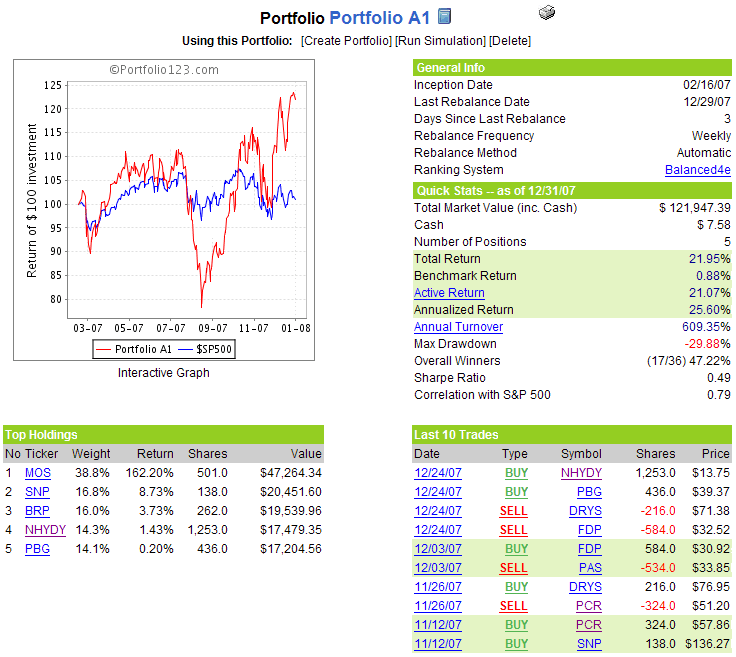
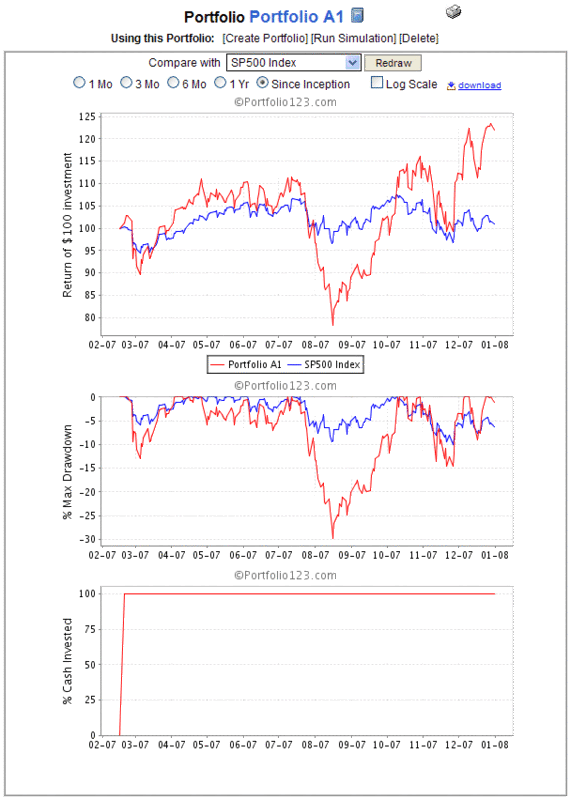
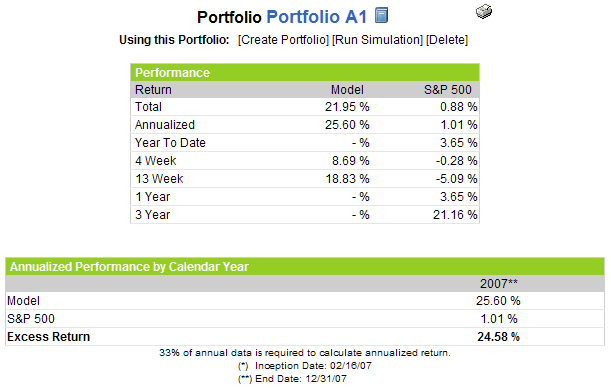
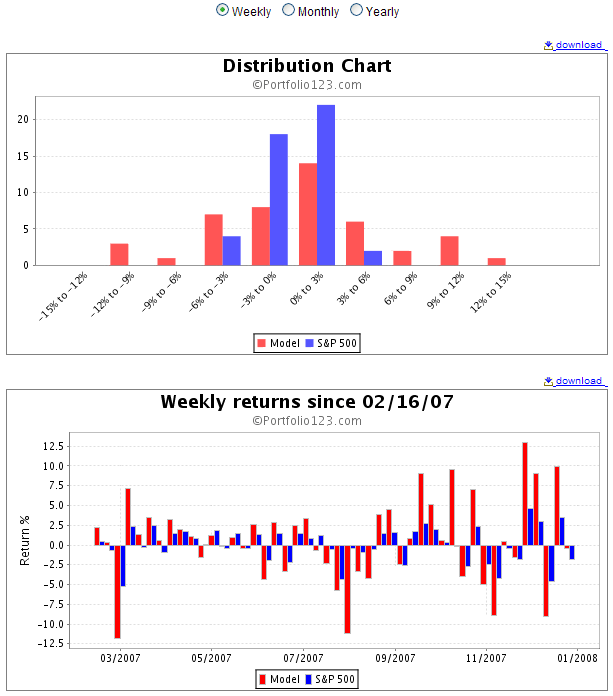
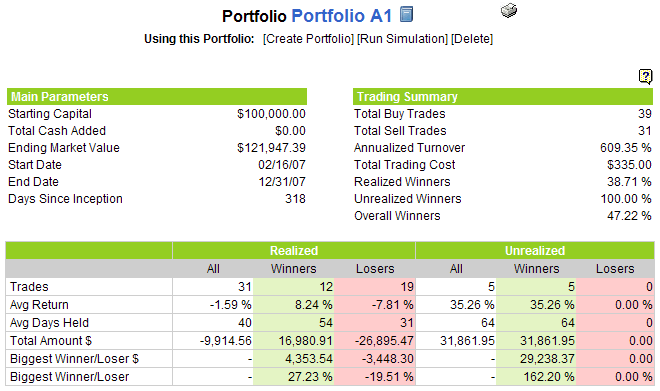
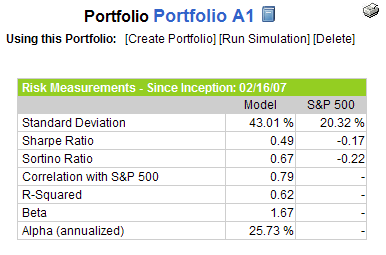
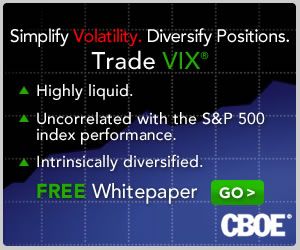

6 comments:
Bill,
Would I be correct in assuming that to make best use of a system such as Portfolio123, a person would need, at least, $50,000 available to invest in the market? For a small time investor or a person starting new with limited capital, Portfolio123's models will remain just that - a model. Without the right capital being available, a person will not be able to build the corresponding portfolio and enjoy the nice returns. Or am I mistaken? Would appreciate your opinion. Thank you!
JD
A good question, JD.
I'm not sure what the minimum portfolio size is that would be needed to get a reasonable ROI from using Portfolio123.
To some extent, a cost benefit analysis of the value of the service depends on your subscription level. I use the Gold ($115/mo) level functionality and get enough to easily make it worthwhile, but I can also see where the Silver ($49/mo) or Bronze ($29/mo) levels might be profitable for account sizes in the $50,000 range. Using those numbers, the annual cost would be 1.2% and 0.7% of that account size, respectively.
In the end, you need to consider the total cost of the software/services, commission costs, and slippage into any system, but you also have to consider the potential lifetime value of the insights and lessons learned. It's always possible that an investment in a book, piece of software, web site, etc. in 2008 might yield a lesson or two that will have a payback over the reset of your investment lifetime. Further, it may take just one investment to recoup your costs.
Ultimately, I like any tool that will allow me to constantly test new ideas, whether they are based on fundamentals or technical analysis -- and allow me to build on my work going forward.
But this is all on the optimistic side...
Given that index funds and ETFs can provide solid returns for expenses in the 0.2% range and hedge funds typically charge 2% + 20% of the profits, I start to get concerned when the total costs of my information, software, R&D etc. get over 0.5% of my account size. That's my personal benchmark, but if you are spending more than 1% to assemble your own portfolio, you might want to consider whether it would be easier to have your money professionally managed for the same fee and devote your time an energy to some other hobbies. Just something to think about.
Of course if you can have just one good stretch, you can always reinvest some of your profits back into the 'business.'
Good luck. I hope this helps.
-Bill
Hello Bill,
Thank you. I am in the East coast... hence, by the time you responded, I was experiencing REM sleep. In addition, it would not be prudent to discuss the stock market while at work. Hence, close to the 24 hour delay in my response. Anyway, thank you for the insightful post!! I shall keep your advice in mind.
I have another question for you. Why do you think an average investor does so poorly in the market place? If my memory serves
me right, a nightly news program on PBS mentioned that an average investor has a ROI of around 4.3%. If this is indeed true then an average investor like me is losing money than making money from their investments. Moreover, this return is only slightly higher than the interests being offered by some of the top money market savings account. And I have been told this means that most average investors ROI is not keep pace with inflation. After thinking about it for a while and learning from my mistake, I think I know why most average investors are losing money. This noobie investor has a theory that he would like to run by you. Please note that if somebody more intelligent than me has already stated this theory, then I am not aware of it and, obviously, my theory is, therefore, nothing more than a late realization on my part.
Anyway, here is my theory. When an average investor decides to invest in the market, he/she does so with limited capital. The cardinal phrase here is "limited capital". Now, because of this limited capital most of the "hot" stocks in the market are beyond his/her "reach". By "beyond his/her reach" I do not mean that the person cannot buy them. Of course, the person could buy the Googles and the RIMMs, but because of the limited capital, the investor will be able to buy maybe 5 or 10 or, at the most, 20 of such high flying stocks. And then they will have to wait for a few monthts to accrue some additional capital before investing again. And, by then the stock might be a little more "out of their reach". Consequently, instead of investing in a fast rising stock, they want to find the next hidden Google or Apple. They want to find the middle tier stocks - stocks that can move either way. And, I believe, psychologically most average investors would like to see 100 shares of $1 stock rather than 1 share of a $100 stock. The illusion of quantity overwhelms quality. Therefore, they make the mistake of buying shares of companies that are currently in the doldrums, and hope that things will turn around, and the prices will rise and, then, they will one day be millionares. But, most of the times a stock is cheap because of a reason, and the reason, most probably, is that the company is faltering or has already faltered. The only direction the price will move in the future is down. Ultimately, this is why most of them to lose money in the market and have an ROI of 4.3%.
Most saavy and successful investors have two things in their favor -
1. they have enough capital, at any point in time, to buy value stock that are rising fast. They are liquid.
2. they don't let emotion make their investing decision. They read what market is telling them, do due diligence and follow the leaders and not the laggards. And everybody knows that it is the laggards of the herd that fall prey to the predators.
And that is why I asked my previous question about Portfolio123. I agree that it must be a very powerful tool. But, my limited capital will not allow me to make best use of its potential. If it recommends me a portfolio of 20 stock, because of my limited capital, I will probably be able to only buy 5 shares of each. And the cost of transaction will just eat into my profits. Do you think my observation is correct or is it fundamentally flawed? Sorry for such a long post. And once again thank you for taking the time responding to my questions. It is much appreciated.
JD
Congrats Bill. Great performance and looking forward to even better 2008.
Happy New Year,
Profitable trading, OP
Thanks, OP, and congrats to you on the superb numbers you put up this year.
JD,
Rather than post a long-winded response to your excellent question here, I am simply going to register agreement with your general premises for the moment and promise to respond in a formal post on the subject in the near future.
Cheers and may your account size grow substantially in 2008,
-Bill
Thank you. And I wish the same for you, too.
Post a Comment